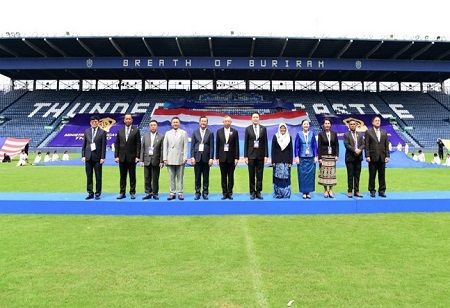Education Ministers and senior officials from ASEAN convened in Buriram, Thailand, for a series of meetings focused on the theme "Transforming Education in the Digital Era." Led by Thailand as the chair of the education sector, the gatherings aimed to address the critical need for digital transformation in education. Participants from ASEAN Member States and partners discussed the importance of boosting investment in education and taking collective action to ensure that education systems are resilient and adaptable to future challenges.
Education ministers provided strategic guidance in advancing the education agenda in the region and beyond and reaffirmed their commitment and endorsement of key documents such as the ASEAN-SEAMEO Joint Declaration on the Common Space in Southeast Asian Higher Education and the Revised ASEAN Plus Three Guidelines on Student Exchange and Mobility: The New Normal Exchanges and Mobility. The Joint Declaration will be submitted to the ASEAN leaders at the forthcoming 44th and 45th ASEAN Summit for notation. The meetings also endorsed their joint commitments to further collaboration on education, not only among the ASEAN Member States but also under the framework of ASEAN Plus Three and East Asia Summit cooperation.
Thailand's Minister of Education, Police General Permpoon Chidchob, addressed the meetings, highlighting the critical need to embrace digital transformation in education. He urged education ministers and delegates to work together to tackle the complex challenges involved in transforming education systems. While acknowledging the significant potential of digital technology to improve education, he also advised vigilance to prevent it from worsening existing inequalities.
Deputy Secretary-General of ASEAN for ASEAN Socio-Cultural Community Ekkaphab Phanthavong also delivered statements and emphasized the significance of the meetings in shaping the future of education in the region. He said, “In the dynamic and diverse ASEAN region, the digital revolution presents us with both significant opportunities and formidable challenges. Our varied regional and national contexts mean ASEAN faces unique obstacles in ensuring equitable education for all. Achieving this requires addressing barriers to education access and inclusion, particularly for women, persons with disabilities, and marginalized communities”.
Senior officials from ASEAN Member States participated in the 19th SOM-ED. In addition to the ASEAN senior officials, the 14th SOM-ED+3 and 7th APT EMM involved representatives from China, Japan, and the Republic of Korea (Plus Three Countries), while the 9th EAS SOM-ED and 7th EAS EMM involved representatives from Australia, China, India, Japan, Republic of Korea, Russian Federation, and the U.S. The ASEAN Secretariat, AUN Secretariat, SEAMEO Secretariat, and partner organization representatives were also in attendance.
The SOM-ED, SOM-ED+3, and EAS SOM-ED were founded in 2006, 2010, and 2012, respectively, to enhance regional education and promote closer collaboration and cooperation on educational development among ASEAN Plus Three and East Asia Summit countries. These bodies report to their respective ministerial groups: the ASEAN Education Ministers Meeting (ASED), the ASEAN Plus Three Education Ministers Meeting (APT EMM), and the East Asia Summit Education Ministers Meeting (EAS EMM).

